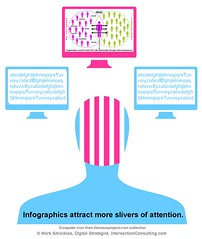We’ve evolved well past the limitations of our own brains into the brains of our closest friends — not metaphorically, but literally. We utilize the people we know and engage with deeply as active extensions — prostheses — of our thinking, reasoning, and creating brain. Science tells us that brainstorming is far more essential to our ability to think greater than ourselves than we could ever have imagined. I posit that our brains can expand this prosthesis of other minds deeply into the Internet, virtually, and can readily physiologically benefit.
According to science, we’ve already evolved to where our brains are not our own. Our minds easily extend to include the minds of the people around us, expanding our capacity to think, learn, remember, and to create. Dr. Stephen M. Kosslyn, of Stanford University, posits that we use our friends and family as a thought prosthesis, not unlike the physical prostheses our wounded warriors use to restore their bodies to near full-capability. I attended a conference over the weekend and got to listen to a seminar by Dr. Kosslyn, an American psychologist who specializes in the fields of cognitive psychology and cognitive neuroscience who is now director of the Center for Advanced Study in the Behavioral Sciences at Stanford University.

He coined the term “Social Prosthesis Systems (SPS) [PDF],” the relational networks that we use, naturally, over time, expanding and refining them according to our needs, and growing them in maturity, access, depth, and prestige over time until the SPS’ value becomes an essential part of one’s ability to maximize thinking, learning, remembering, and creating. In many ways, without access and engagement to one’s SPS — if one were to be cut off or shunned by one’s extended SPS — one’s ability to function could very well become hobbled and one’s continued success could well be irreparably damaged beyond repair.
While we did not discuss online social networks, social graphs, virtual communities, or social media as part of the SPS, it only seems natural that the same ease with which we’re able to expand the brains inside out heads off into minds that co-process, co-think, and co-create when openly sharing, conversing, engaging, and interacting with other people, in real life (IRL), we’d also be able to readily expand this tendency to group-think, group-create, and group-create into the Internet and out to all of your friends and followers online.
And these deep and personal influences are physiological, profound, and create essential pathways in not only the brain but the general physiology of the participants, if I understand Dr. Kosslyn correctly.
What this means to me as a social media strategist, as a devotee to online community participation since dialing-in to bulletin board systems (BBS) circa 1983, and as a reputation manager, is that one must remember that your followers, friends, and connections are real people and that no matter whether they’re Weak Ties or Strong Ties, these interactions are complex, profound, and potentially can influence you physiologically, changing your neurological patterns in very profound ways. What’s more, if you work on transitioning, in your mind, all the followers and friends you have collected over time from being big stacks of baseball cards, valuable only for their potential dollar or marketing value, to being important and deep extensions to your mind and literal extensions of the neural pathways of your physical brains.
I don’t mean to get too heavy, but the social networking services that you engage with both personally and professional in the course of your life, if properly cultivated, pruned, grown, fed, watered, and exercised, can become a very powerful and profound social prosthesis, in many ways your most valuable of assets, your killer app, your secret sauce, and the most competitive advantage in your life — allowing you to access the sort of insight and creativity that very few people in history have every been gifted with from birth and within the limits of their very own heads.
So, next time you think Twitter, Facebook, Pinterest, Google+, reddit, StumbleUpon, Instagram, and Wikipedia are stupid wastes of your time, consider again: they may well be the most profound. Not only that, but fully harvested, they can physically allow you to be smarter than you are on your own. In many ways, the social web is the closest thing we have, thus far, to a smart drug with guarantees of making increasing your IQ well above the horsepower that genetics and God intended.
If you’re interested in learning more about this subject, I can recommend the book Is the Internet Changing the Way You Think?: The Net’s Impact on Our Minds and Future — in it there’s a chapter called “Social Prosthetic Systems,” written by Stephen Kosslyn himself.





